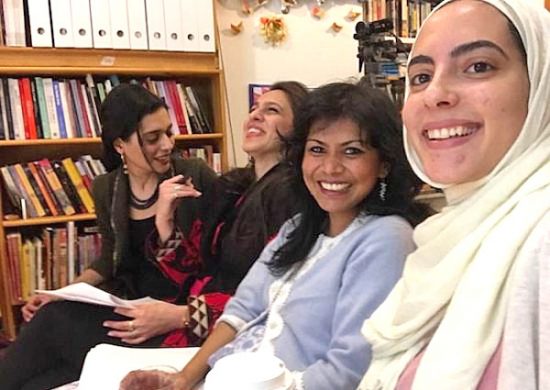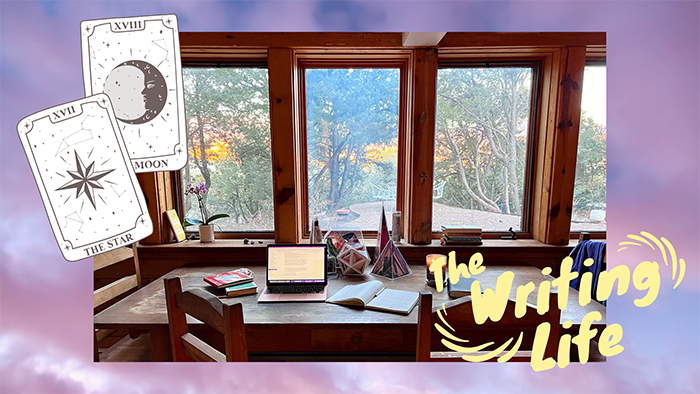Former Open City Fellow Hannah Bae answers ten questions about her writing life

April 7, 2022
“Writing is easy,” Pulitzer Prize–winning sportswriter Red Smith once said. “All you do is sit down at a typewriter and open your veins, and bleed.” Putting pen to paper (or fingers to a keyboard) is never a simple task, even for seasoned writers. Even our Margins and Open City Fellows—and there’s quite a handful of them—can attest to that. Many of them, though, have gone on to write and report for mainstream publications and publish books. In this series, we reached out to our former fellows and asked them to give us a glimpse of their writing lives and to share some tips on how they navigate this creative process called writing.
Hannah Bae was an Open City Fellow in 2019. She spent pretty much her entire fellowship researching, interviewing, and writing her story, “Is This What We Consider ‘a Good Education’?,” that sought out the unheard voices impacted by the controversy surrounding the specialized high school admissions test. In “What Does It Take to Create Art That Bridges Divides?,” Hannah writes about a Brooklyn-based art teacher who has connected generations, continents, and patterns of migration in her work.
“If You Don’t Want to Try This at Home” is her paean to the hate-it-or-love-it durian and the brave NYC place that serves nothing but. Hannah opens up about her childhood, and how caring for children is helping her reckon with her own childhood abuse in “The Give and the Take.”
Here’s Hannah.
—Noel Pangilinan
1. What’s on your nightstand?
I’m writing to you from a residency at the Peter Bullough Foundation in Winchester, Virginia, so this is a little pared down from my nightstand at home. But here’s what I’ve got: earplugs, an eye mask, and a glass of water, which are essentials, even at home in NYC! I also have an unlit candle by Tanaïs, who is a former AAWW Open City fellow—everyone NEEDS to read their new memoir, In Sensorium: Notes for My People.
Candles aren’t technically allowed at this residency, so I absolutely will not light it here, but I find that when I’m sleeping in a new place, I really feel comforted by the scent of home. My favorite scent from Tanaïs is Namaka, and I burn it in my home office all the time.
And, of course, I love to have a great book at my bedside. This one is Stephanie Foo’s incredible new memoir, What My Bones Know: A Memoir of Healing from Complex Trauma. More on that below!
□ □ □ □ □
2. Coffee or tea? Why?
Coffee! It’s funny, I only started drinking coffee daily once I really settled into living in New York! But now it’s totally part of my routine to make a nice, strong French press pot in the morning.
□ □ □ □ □

3. Any book you’re reading now? Any podcasts you’re listening to now?
I am always reading a few books at a time, but the main one right now is Stephanie Foo’s What My Bones Know: A Memoir of Healing from Complex Trauma. I was lucky enough to attend Stephanie’s book launch and read some brilliant early pages from her book, and the finished version is even more astounding and excellent than I ever could have imagined. It’s heartfelt, witty, incredibly informative about therapy and complex PTSD, and so funny. It’s rare that I read a book on surviving trauma that has this much humor, and I love it so much. Stephanie writes with a finely honed voice that’s totally distinctive. She is an inspiration!
□ □ □ □ □
4. Any writer who influenced you growing up?
I feel like I’m in this phase of life where I can’t stop talking about my college mentor, M. Evelina Galang! I just wrote a critical essay for the Ploughshares blog about her most recent book, Lolas’ House: Filipina Women Living with War, and Kim Soom’s novel One Left and Emily Jungmin Yoon’s poetry collection, A Cruelty Special to Our Species.
Evelina was my undergraduate thesis adviser in creative writing at the University of Miami, and she has taught me so much about not only the craft of writing, but also the change that writing can create in the world. This may be a spoiler, but I also wrote another essay about Evelina that’s forthcoming in the anthology Uncertain Girls.
Really, both of these essays are about how much her teaching shaped me and my curiosity and courage as a reader and as a writer. I want to underscore the fact that I didn’t come into Evelina’s classes way back in 2005 fully formed as a writer. I wouldn’t even say I was a particularly good writer by the time I graduated with my bachelor’s in 2006.
It took me many years of tenacity and commitment and continued education and living and reflection to get me to this point—and I am still developing as a writer. For many years, I didn’t understand the impact that Evelina would have on my writing. I am so very grateful that she helped form me.
□ □ □ □ □
5. What book made you cry?
I recently devoured Juhea Kim’s debut novel, Beasts of a Little Land, which is a historical epic that is perfect for fans of Min Jin Lee’s Pachinko. I originally got it as an audiobook from the library, and while I was at Ragdale, another residency, I would listen to it and walk around the prairie behind the house I was staying in. There were times when I would just listen and ugly-cry and hike in the winter cold, especially the scenes where Kim depicts the March 1 Korean independence movement against Japanese colonization.
While I’ve read a lot of history and journalism about the March 1 Movement, I’d never read fiction that portrayed it, and it was striking to me to feel so much power and emotional resonance in the beauty of Kim’s words as literature. I think I must be preoccupied with the notion of courage right now, because that was the overwhelming impression that this book and its characters left on me. I ended up buying a hard copy of the book (from Yu & Me Books, woohoo!) because I know I’ll want to refer back to this one often. Beasts of a Little Land made me so proud to be Korean. It reminded me that I come from humble, yet incredibly courageous people.
□ □ □ □ □
6. How and where do you get ideas for your stories?
I find most of my writing inspiration through reading. I read widely—not just literature, but also journalism, history, academic texts, criticism, and more. I also read outside my own genre of memoir and nonfiction, turning to poetry and fiction and graphic novels often. Most often, something I read will trigger a memory of mine, and I’ll open up my Notes app on my phone or my paper notebook or just get out a pen and write in the margins of a book (if it’s one I own) and jot down some thoughts that I’ll come back to when I’m ready to write.
A few months ago, I read Victoria Chang’s excellent new book, Dear Memory: Letters on Writing, Silence, and Grief, and I felt like each chapter prompted me to slip into a reverie of my own memories of people important to my life: teachers, family members, ancestors, friends, enemies, and more. I feel like Dear Memory could be a wonderful handbook for so many writers in this way!

□ □ □ □ □
7. How do you deal with writer’s block?
REST. I felt so awful for entire months during the early part of the pandemic. I could not write. I felt hopeless, and I wondered if I’d ever be able to write again. But once I forgave myself and stopped putting pressure on myself, I found my way back. It’s funny, I kept telling people “I can’t write,” but when I look back at my notebooks, I see that I was getting on Zoom with writer friends nearly every week and doing free-writing exercises with totally no expectation that any of it would be publishable. It was a sense of playfulness that brought me back to the page.
□ □ □ □ □
8. What are you working on now and what recent work are you proud of?
Since even before my AAWW Open City fellowship, I’ve been working on a memoir manuscript. It’s about growing up the daughter of Korean immigrants in a troubled home, how I felt estranged from my parents’ culture, and then how I built up healthy boundaries between me and my parents that actually allowed me to connect deeply with my Korean roots and heal. I’ve been pulling together everything I’ve written so far and taking stock of the entire manuscript-in-progress, and I’ll be workshopping it in early April!
□ □ □ □ □
9. What’s your favorite bookstore or library? Tell us why it’s your favorite.
Yu & Me Books in Manhattan’s Chinatown! It’s NYC’s first Asian American woman–owned indie bookstore, and it’s the most beautiful, welcoming space. Lucy Yu, the owner, is a visionary who brought this dream of hers to life, and even though it’s only been open a few months, this bookstore already feels like home to me.
□ □ □ □ □
10. What’s your fondest memory of being an AAWW Fellow?
I know amazing Astha Rajvanshi, who was part of my cohort, has already mentioned this in The Writing Life, but our group of fellows and Noel, our mentor, went on an immigrant food tour of Bay Ridge, Brooklyn, and it was an unforgettable day! I was getting over an awful cold at the time, but I was feeling well enough to come out and eat (and not get anyone else sick!), and I’m so very glad I did. I think it’s the best eating day I’ve ever had in NYC, and with true soul companions at that!
□ □ □ □ □
You may also be interested in these related stories:
Write a Sentence—Any Sentence—No Matter How Bad It Is by Astha Rajvanshi
Intuition Is My Main Tool by Chaya Babu
Writer’s Block? What’s That? by Humera Afridi
Write Like a Fugitive by The AAWW Interns



